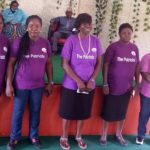Nengak Gondyi
I read with keen interest Professor Farooq A. Kperogi’srecent article titled “Wonders of Hausa-Speaking Northern Christian Names”. The author reflects on naming practices among Hausa-speaking Northern Nigerian Christians, the “miscellany of ethnic groups” found primarily in the northwest, northeast and north central (Plateau and Nasarawa states) and united by Christianity and the Hausa language. To explain the exclusion of states like Benue, Kogi, Kwara, and Niger, Kperogi found that “most Christians [in these areas] historically bear conventional Western Christian names”. Overall, the article raised important points, for example the invisibility of the Northern Christian, leading to the erroneous bifurcation of Nigeria into a northern Muslim and a southern Christian half. Many people already understand the shared heritage betweenthe Abrahamic religions of Christianity, Islam and Judaism. As such, tracing origins and ascribing ownership of names and traditions within these religions would be a tiresome and unfruitful. SoKperogi’s tracing of X in the Hausa Bible to the Arabic language which has XX, rather than the English Bible which has XZ, is flawed. Kperogi claims to be “researching” into the “fascinating cultural repertoire” of Christians in northern Nigeria. If any researchwas conducted, evidence of it is not included in the article.
An attempt to understand anything about Christians in northern Nigeria would need to begin with the history of Litaffi Mai Tsarki, the Bible in Hausa language. This will in turn require familiaritywith the history of Christian evangelism in northern Nigeria. I am no expert on this subject and I will not be able to discuss its complexity. I will note, however, that the first (1932) translation of the Bible into the Hausa language was authored principally by Dr. Walter R. S. Miller. According to Musa Gaiya, “the 1932 edition of the Hausa Bible was almost entirely the handiwork of European missionary translators using local informants, such as Mallam Fate, a Hausa Christian, and Mallam Bello, a Muslim”. I am very aware of the use of the Arabic Bible in translating the Bible into Hausa and the subsequent efforts to de-Arabize Hausa Christianity, but that discourse is hardly anchored on the transliteration of Abrahamic names.
Kperogi declares with authority that “Hausa-speaking Christians, especially from older generations, are baptized as Yakubu instead of Jacob”. I have two problems here. First, “instead of Jacob”, suggeststhat the English Language Bible is the canon for Nigerian Christianity such that Jacob is the norm (or “conventional”) while Yakubu is a wonder. Secondly, data is lacking to back the sweeping generalizations about naming patterns across generations.Each name is unique, so is the reason behind it. Attempts to understand naming practiceswould need anthropological studies whichare best clustered by geographical, rather than faith communities. In another authoritative quote, Kperogi argues that the “Hausa and Arabic [languages] are members of the same Afro-Asiatic language family; it makes sense that Hausa speakers who want to indigenize a Western name would prefer its Arabic rendering”. If it is true that Hausa and Arabic are related, is it not natural then that their renderings would be similar? If Kperogi intends to spend more time on this subject, it is important to learn a bit more about Christianity. A more nuanced understanding of Christianity would have shown that the communities lumped together as “Hausa-Speaking Northern Christians” are not at all similar and some are not “Hausa-Speaking” but simply Hausa.
A problem arises when we call native Hausas “Hausa Speaking”. Naming practices among Hausa Christianswould differsfrom say, Plateau or Borno where many Christians are not necessary “Hausa-Speaking”, but “Hausa-worshipping”. That is, they speak other languages, but practice Christianity in Hausa. Identifying the language of worship is important– for example, Benue did not fit into Kperogi’s thesis because in Benue the Tiv translation of the Bible, not Hausa was the tool for initial penetration of Christianity. Christianity can wholly be translated; an English speaking Christian refers to “God” while the Hausa-speaking counterpart refers to “Allah” – two words with no etymological relation.It is common to find Christians versed in the scripture in their language and not knowing anything about the same faith in other languages. Among Christians, this is no “wonder”.
Kperogi is right about the absence of the consonant “p” in the Hausa languagewhichleft translators with the consonant “b” – in some cases they go to “f”. However, it verges on arrogance to claim that this is the influence of Arabic on the Hausa version of the Bible. How Arabicised is the Hausa Bitrus when the Greek original is Petros? How else could a language that has no p render this name without Arabic influence? Take Jacob which originated in Latin as Iacobusthen appeared in Arabic as Ya’qub and in Hausa as Yakub or Yakubu. How do we prove that the Hausa translators had their finger on the Arabic Ya’qub and not the Latin Iacobus? Finally, Isaiah whom the Hausa Bible calls Ishaya – despite the absence of the name in Islam, Kperogi insisted the Hausa Bible borrowed from the Arabic Bible’s Asa’ya and says nothing of the Hebrew Yesaʻyahu.
In a haste to theorise the influence of the Arabic language, Kperogi has ascribed to himself mastery of the Bible which he does not claim to have read, and of Christian religion and of the practice of naming in Christian communities. When Kperogi claims that “in their bid to blend in with their southern and north-central co-religionists, Hausa-speaking northern Christians appear to be increasingly embracing this category of names [conventional Western Christian names like John or Rachael]”, he completely missed the point. The Hausa-Speaking Northern Christians are increasingly worshiping in English nowadays due in part to the increase in literacy in English, and in part under the influence of Pentecostalism (see for example the works of Wariboko, Burgess and Cooper.
If Kperogi’s article “causes the reader to develop a heightened awareness of the importance of names, especially of Hausa Christian names”, I would not know. I worry that it diminishes the identity of the Hausa-Speaking Christians, and supports the banal appropriation of culture. Kperogi’s “wonder” at Hausa Christian names is akin to one being amazed by a Muslim called Abdullahi.He claimed to “have shown” how Arabic language has influenced the Hausa Bible using titbits of conversation with lay friends and alleged ‘onomastic analysis’ of names found between the Arabic and the Hausa Bibles.
Since the 1930s, the Hausa language Bible has shaped not just faith but influenced the spread of Hausa language to create what Kperogi calls “Hausa-Speaking Northern Christians”. It is surely among the most read texts in the Hausa language corpus.The review of selected names does not pass for onomastic research nor does it do justice to the true wonder that is Christianity in northern Nigeria.
- Gondyi writes in from Maiduguri, Borno State.
WATCH TOP VIDEOS FROM NIGERIAN TRIBUNE TV
- Let’s Talk About SELF-AWARENESS
- Is Your Confidence Mistaken for Pride? Let’s talk about it
- Is Etiquette About Perfection…Or Just Not Being Rude?
- Top Psychologist Reveal 3 Signs You’re Struggling With Imposter Syndrome
- Do You Pick Up Work-Related Calls at Midnight or Never? Let’s Talk About Boundaries






